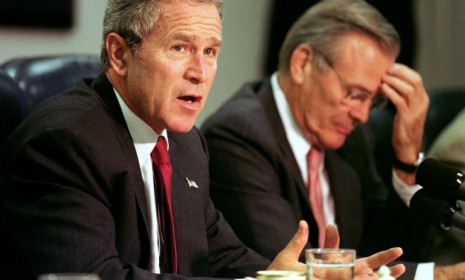The new evidence that Bush could have stopped 9/11: 4 takeaways
A former New York Times investigative reporter argues that George W. Bush ignored months of daily briefings that should have raised red flags

A free daily email with the biggest news stories of the day – and the best features from TheWeek.com
You are now subscribed
Your newsletter sign-up was successful
Eleven years after the Sept. 11 attacks, a controversial op-ed piece in The New York Times has rekindled the bitter debate over whether George W. Bush ignored clear warnings that an al Qaeda attack was imminent in 2001. Former Times investigative reporter Kurt Eichenwald, author of the new book 500 Days: Secrets and Lies in the Terror Wars, writes that the most infamous red flag, a now-declassified Aug. 6, 2001, presidential daily briefing with the ominous headline "Bin Laden Determined to Strike in U.S." really didn't contain any specific details on a coming strike. Nevertheless, Eichenwald says he has read other daily briefs, still classified, that warned for months that Osama bin Laden and his al Qaeda terrorist network had "a group presently in the United States" that was preparing a spectacular attack aiming to inflict mass casualties. Did Bush really have a bigger heads-up about 9/11 than previously disclosed? Here, four takeaways from Eichenwald's account:
1. Bush had plenty of reasons to go on alert
For years, we've heard about "then CIA chief George Tenet running around Washington with his hair on fire" trumpeting the looming danger, says Massimo Calabresi at TIME. Then-national security adviser Condoleezza Rice and others insisted that, despite vague warnings, there was "no actionable intelligence" that could have helped defuse the threat. Eichenwald's reporting shows there was "plenty the administration could have been doing to disrupt the plot without knowing the specifics of time and place." Nobody will argue that the Bush administration "distinguished itself in the summer of 2001," says David Frum at The Daily Beast, but Eichenwald is only telling a sliver of the story. The CIA failed both to cooperate with the FBI in blocking the conspirators from entering the U.S., and to share their watch lists with local police — a Maryland state trooper pulled over hijacking pilot Ziad Jarrah for speeding two days before the attacks, and let him go. The "worst mistakes" occurred before Bush ever got his briefings, "and they occurred within the national security agencies themselves."
The Week
Escape your echo chamber. Get the facts behind the news, plus analysis from multiple perspectives.

Sign up for The Week's Free Newsletters
From our morning news briefing to a weekly Good News Newsletter, get the best of The Week delivered directly to your inbox.
From our morning news briefing to a weekly Good News Newsletter, get the best of The Week delivered directly to your inbox.
2. Bush neocons were more worried about Iraq than al Qaeda
One particular passage in Eichenwald's "jaw-dropping scoop" really "reads like a nightmare," says Adam Clark Estes at The Atlantic. He says that neoconservative leaders at the Pentagon convinced the White House early on that "the C.I.A. had been fooled" into believing that al Qaeda was plotting an attack. The neocons thought bin Laden was trying to distract the Bush administration from Saddam Hussein, "whom the neoconservatives saw as a greater threat." Intelligence officials said that was "ridiculous," as an Islamist fundamentalist like bin Laden wouldn't cooperate with a secularist dictator like Hussein, and the CIA presented an analysis essentially pleading with the White House to accept that bin Laden posed a real threat, but the neocons kept the spotlight on Iraq.
3. Officials were so frustrated they considered quitting
In the spring and summer of 2001, the CIA presented compelling evidence that a large-scale al Qaeda attack was imminent, says Paul Campos at Salon, and still "the Bush administration did nothing." According to Eichenwald, officials at the CIA's Counterterrorism Center "grew apoplectic, and at one meeting even discussed putting in for transfers "so that somebody else would be responsible when the attack took place." The suggestion was dismissed, as nobody thought there would be time before an attack to train replacements.
A free daily email with the biggest news stories of the day – and the best features from TheWeek.com
4. If anything, this op-ed proves we shouldn't blame Bush
The only thing Eichenwald's so-called scoop reveals, says Mark Finkelstein at News Busters, is how far the anti-Bush press will go to "exploit 9-11 for low partisan purposes." If these murky new tidbits are the best that investigative journalists can come up with, the evidence that George W. Bush ignored indications that al Qaeda was close to pulling off an attack on American soil — or that he could have stopped it — is thin gruel indeed. This new account adds nothing to the historical record: It's "cheap political exploitation and finger-pointing at its basest."
-
 The environmental cost of GLP-1s
The environmental cost of GLP-1sThe explainer Producing the drugs is a dirty process
-
 Greenland’s capital becomes ground zero for the country’s diplomatic straits
Greenland’s capital becomes ground zero for the country’s diplomatic straitsIN THE SPOTLIGHT A flurry of new consular activity in Nuuk shows how important Greenland has become to Europeans’ anxiety about American imperialism
-
 ‘This is something that happens all too often’
‘This is something that happens all too often’Instant Opinion Opinion, comment and editorials of the day